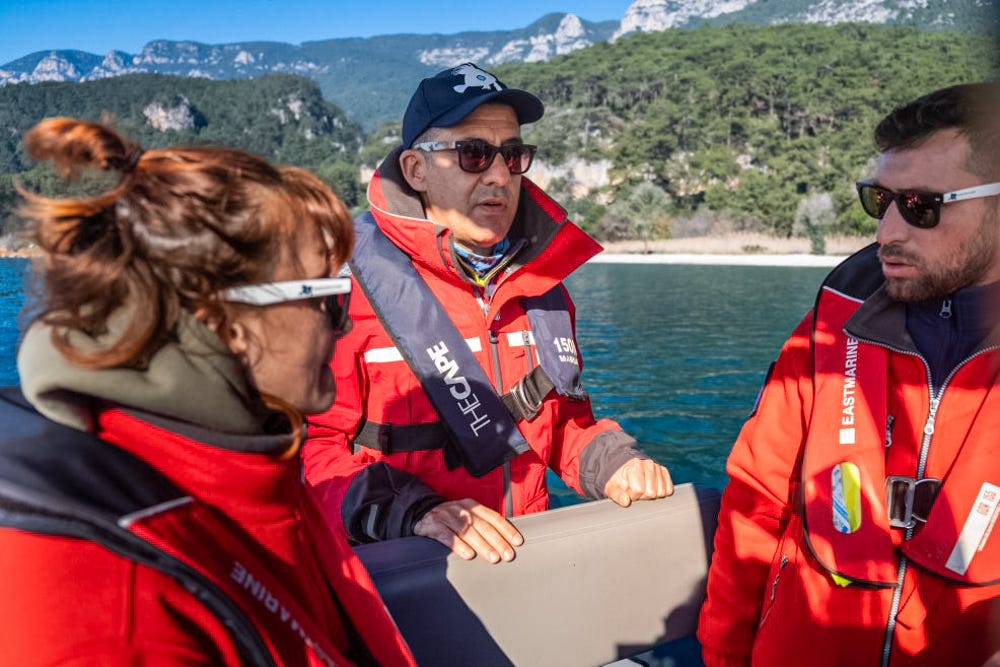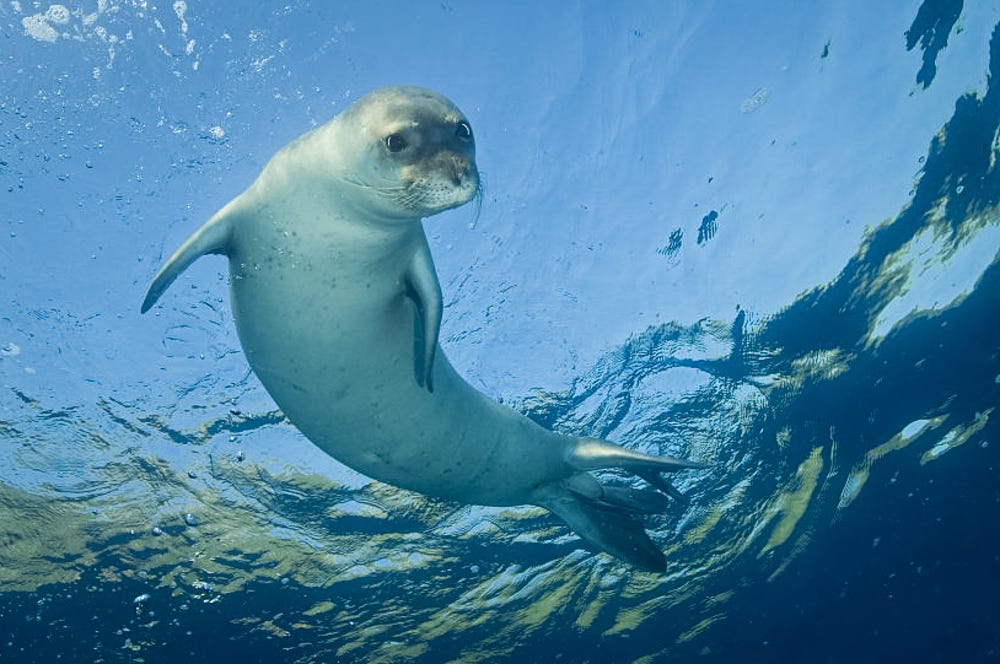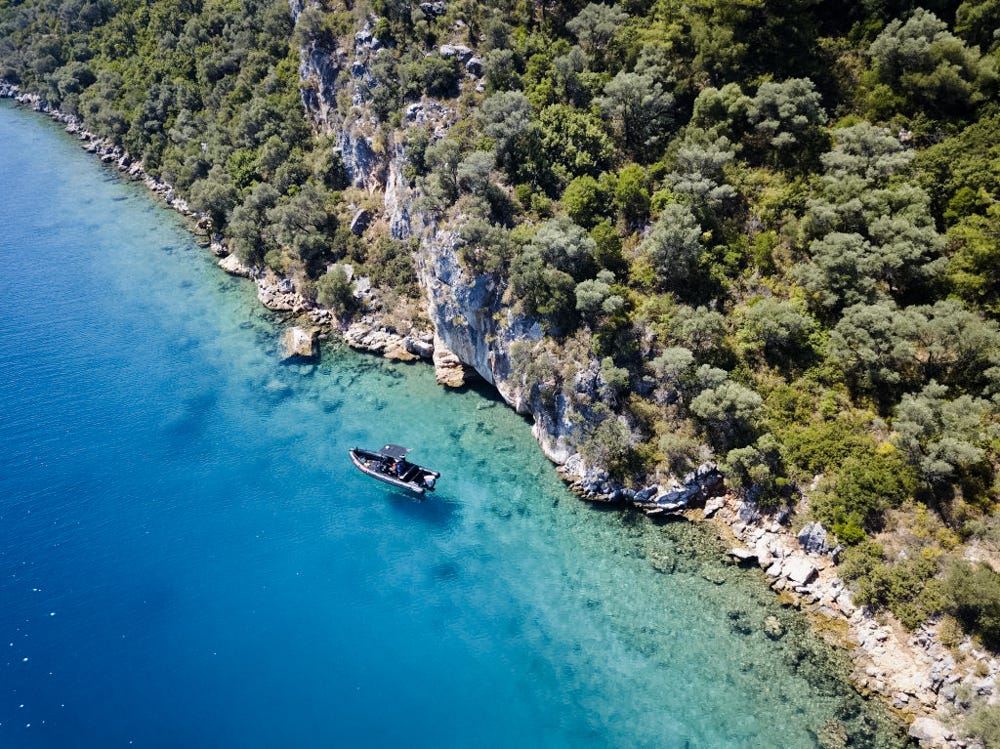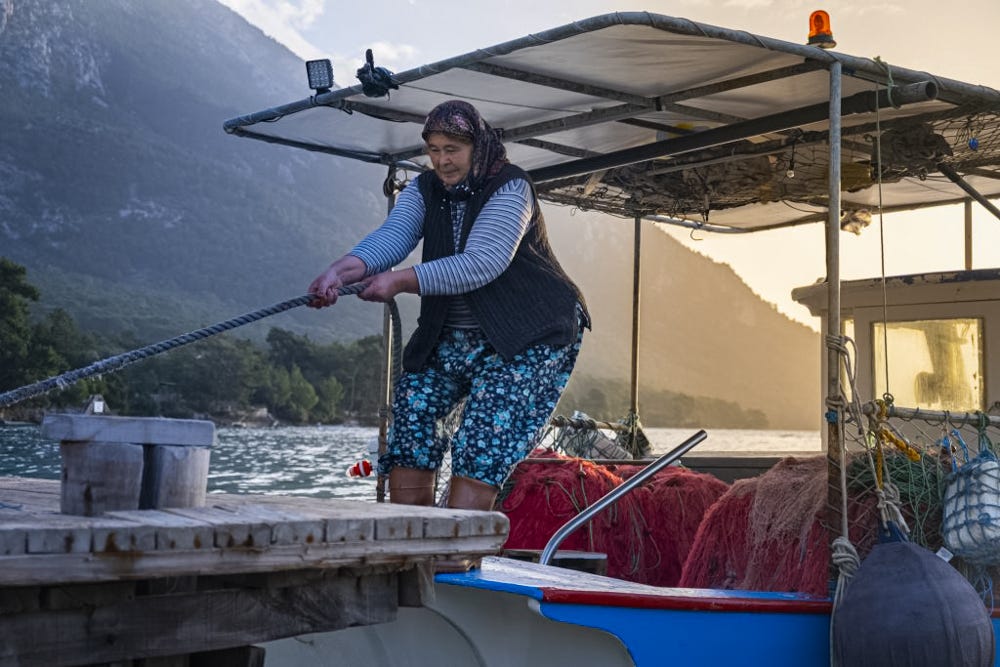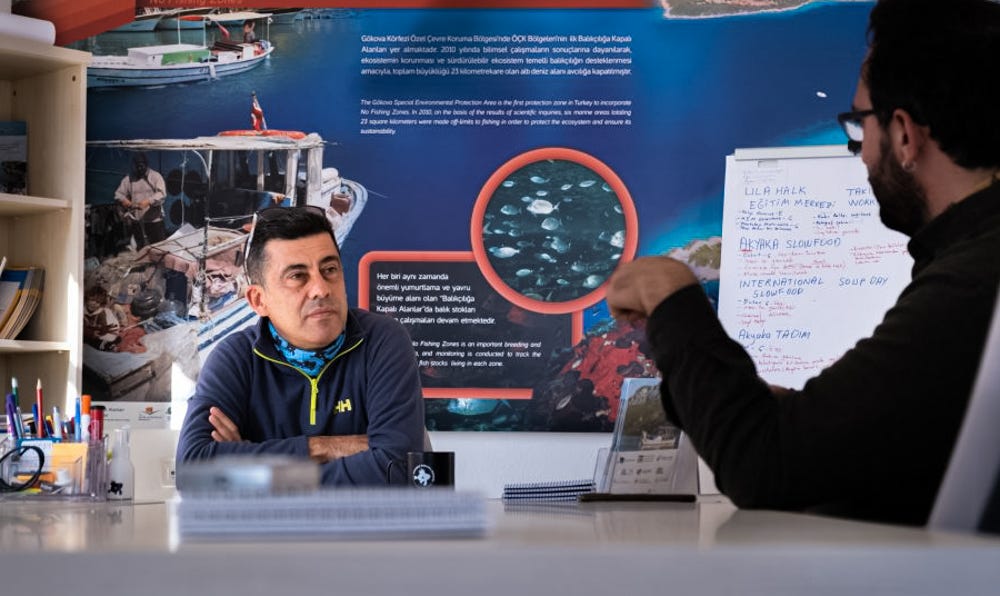Sea bottom to table top: Turkey’s first “Green Nobel prize” winner aims to protect marine life
Despite their natural beauty, the pristine blue tones of Turkey’s southern seashores may appear vibrant this summer, but below the surface a daily clash is playing out between creeping ecological collapse and conservation efforts aiming to preserve local marine life.
Leading the fight is Zafer Kızılkaya, who in April became Turkey’s first recipient of the Goldman Environmental Prize, considered the “Green Nobel prize” for international conservationists.
Kızılkaya and his 24-member team essentially convinced the Turkish government to expand Marine Protected Areas (MPAs) by 350 km in 2020, imposing fishing restrictions on gulfs, coves and bays between Muğla’s Datça peninsula and Antalya’s Kaş and Kekova areas.
The achievement came after years of initiatives that Kızılkaya has directed since 2012, when he founded the Mediterranean Conservation Society (AKD). Among other activities, the group monitors seashores and has equipped communities to report illegal fishing activities while also helping local fishers sell invasive species to restaurants in effort to reduce their populations.
Taken together, the AKD’s conservation initiatives have successfully boosted native fish stocks and, as a result, the local fishing industry despite ecological pressures posed by the effects of climate change and a booming tourism sector.
Speaking at the Goldman Prize ceremony this spring, Kızılkaya smiled with confidence as he announced a 400 percent profit increase for local fishers following the expansion of MPAs in Turkey.
“The community knows the value of enforcement. They fight with professionals, even people from their community [who are] attempting illegal fishing,” Kızılkaya said during his speech.
Kızılkaya has since continued to underline the important role protected areas play in greater regional biodiversity
“In the winter the water looks blue. But when you dive, there is nothing,” he told Turkey recap. “There should be places only for wildlife, only for nature.”
While the Mediterranean region comprises less than 1 percent of all global ocean and sea surface, it is home to 18 percent of the world’s marine species, filled with native rarities like the endangered Mediterranean monk seal – all of which are threatened by overfishing.
After he returned to Turkey in 2007 following conservation work in the Pacific Ocean, Kızılkaya has worked non-stop to counter regional environmental degradation. With time and mounting honors, Turkey’s Ministry of the Environment and Ministry of Agriculture eventually recognized his team’s efforts, even if Kızılkaya complains that they mostly sit on their hands.
“If we move away for just two weeks, or a month, everything will collapse,” Kızılkaya said. “We do the enforcement, but we’re just a civil initiative. It is dangerous and costly. This year, we are expanding, though as you may appreciate, the area is huge.”
He continued, saying the AKD has been making progress with nine ranger boats and 14 rangers with the support and cooperation of the coast guard along with monitoring assistance from local community members.
“Shark and monk seal sightings are going up,” Kızılkaya said. “The ecosystem is kind of healthy.”
Marine protected areas
While Turkish coastlines now host a total of over 600 km of MPAs as a result of conservation efforts over the last two decades, no-take zones – where all fishing is prohibited – represent just 0.04 percent of the coastline.
The number is far short of a “30 by 30” protocol issued by the US-based Center for Biological Diversity, which calls on all nations to protect at least 30 percent of their coastlines by 2030, 10 percent of which should be no-take zones. Marine life experts don’t expect Turkey to meet the quota on time.
“No-take zones are crucial for increasing fish populations. However, during the winter, not being able to access these areas puts us in a difficult situation,” said Mehmet Doğan, a local fisherman since the age of 8.
Doğan spoke to Turkey recap in an interview arranged and translated by AKD communications specialist İlkay Kavak. Now 65 years old, Doğan said he and his wife continue to rely on fishing in Gökova Bay for income.
“Before the AKD, we didn't have much knowledge about Marine Protected Areas. There were restricted areas designated by the Fisheries Department in the region, but in 2011 they expanded,” Doğan said. “After MPAs were established, we were able to catch more fish.”
Observation teams composed of AKD rangers use a SMART app to record overfishing infringements perpetrated by professional and amateur fishers.
Analyzing data from such field work, Kızılkaya estimates amateur fishers are responsible for 90 percent of localized overfishing. Amateurs, which operate small vessels, represent 50.9 percent of overall fishing activities, while the other 49.1 percent are commercial fishers.
Despite their title, Kızılkaya noted that amateurs tend to organize powerful government lobbies to support their livelihoods.
In response, Kızılkaya organizes AKD activities across four MPAs, including the Gökova Bay Special Environmental Protection Areas (SEPAs), Datça-Bozburun SEPAs, Kaş-Kekova SEPAs, and Fethiye-Göcek SEPAs, with funding from the Cambridge University-based Endangered Landscapes Programme.
These MPAs are in the heartland of Turkey’s Riviera, where “blue cruise” tours attract throngs of tourists from around the world. Anchoring over fragile beds of seagrass, the tour boats can degrade natural protections against coastal erosion.
At the same time, tour groups are increasingly dumping trash on coastlines and discharging black water, endangering fisheries that are already threatened by over 100 invasive species.
If you can’t beat ‘em, enjoy ‘em
As a result of climate change, Turkish coastal waters are warming up and inviting aggressive newcomers, like lionfish and soldierfish, two invasive species that can harm ecosystems by tipping the balance between predators and herbivorous fish, causing greater disruptions in the presence of algae and marine vegetation.
“New species continue to arrive. Lionfish, brushtooth lizardfish and Randall’s threadfin bream are some of the species we catch,” Doğan, the fisherman, told Turkey recap. “It’s getting harder for us to find local fish. Invasive species, like lionfish, have become a new source of income for us.”
In light of the warming waters and changing fish populations, the AKD has encouraged the catch and sale of many invasive species to restaurants.
Across Turkey, seafood chefs looking to support marine biodiversity have already begun purchasing invasive fish directly from AKD and cooking them with culinary panache to lure patrons.
Saltator, a traditional fish restaurant in İstanbul, is among a growing trend of restaurants working with AKD to make dishes using the invasive lionfish. Its young chef, Duru Akgül, said she seeks to focus on sustainably and encourages customers to try new dishes, even if it’s not always easy.
“At first, it was challenging, because it’s not only about making a dish using lionfish, it's also about being able to sell it,” Akgül told Turkey recap. “If you talk about the story and how important it is, it makes a lot of difference.”
With repeated attempts, she said clients’ hesitation to try invasive species seems to have softened, especially since Akgül began preparing a lionfish tartare over corn bread crackers in tiger’s milk sauce.
“It’s delicious and fun to eat,” Akgül said.
Although relatively new at Saltator, Akgül has also invented a new signature dish to cook the invasive soldierfish, which she also buys from the AKD. The result is less invasive species in the sea.
In 2022, AKD bought eight tons of lionfish from fishers, which would otherwise have been discarded back into the wild. Working with the community, AKD designs special gear for fishers to reel in invasive species.
Still, despite the progress, Kızılkaya said he expects 30 percent of fish on the Turkish Mediterranean coast to be invasive species by 2025.
Underlining the struggle to preserve native biodiversity will require continued and creative interventions, Kızılkaya said the AKD would organize two festivals in August and September in southern Turkey to raise public awareness of the problems facing local marine life.
To lighten the mood, he said the events would also serve up premiere invasive species dishes made by chefs and celebrities.
“Restaurants that neither you nor I can afford will make a huge, invasive species dinner,” Kızılkaya said.
Turkey recap is an independent news platform supported by readers via Patreon and Substack. Supporters get access to our Slack channel, timelines, calendar and more.
We also invite you to visit our merch store, but if you simply liked what you’ve read, subscribe here or share it with a friend. Queries and pitches: info@turkeyrecap.com.
Diego Cupolo, co-founder + editor @diegocupolo
Gonca Tokyol, freelance journalist @goncatokyol
Ingrid Woudwijk, freelance journalist @deingrid
Verda Uyar, freelance journalist @verdauyar


